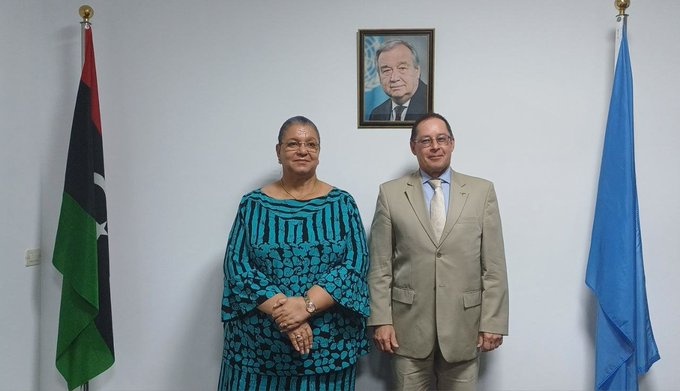
Libya’s foreign minister met with the Russian ambassador in Tripoli on Thursday, a day after Moscow accused the Government of National Unity (GNU) of coordinating with Ukraine to support terrorist groups in the Sahel.
Taher Al-Baour, Libya’s Minister of Foreign Affairs and International Cooperation, received Russian Ambassador Aidar Rashid Aghanin to discuss bilateral relations, economic cooperation, and regional developments, the Libyan foreign ministry said in a statement.
The meeting followed a statement by Russian Foreign Ministry spokeswoman Maria Zakharova, who alleged that Kyiv and the Tripoli-based government were supplying attack drones and training militants active in the Sahel region, aiming to destabilize areas under Russian influence in Africa. Neither Libya nor Ukraine has officially responded to these claims, which analysts describe as a political move to pressure Tripoli.
Despite the tensions, both sides expressed a desire to maintain diplomatic dialogue. “Thursday’s meeting provided an opportunity to examine prospects for cooperation in the political, economic, and security fields, and to coordinate positions on several regional issues,” the ministry said.
Russia maintains a military presence in eastern Libya through the Africa Corps paramilitary group, a successor to the Wagner network, and has historically maintained an ambivalent relationship with the Tripoli government recognized by the United Nations. Bilateral trade resumed in 2023 after years of suspension, reflecting Moscow’s interest in consolidating influence across the Mediterranean and Sahel regions.
Observers note that the talks represent an attempt to defuse rising tensions between Tripoli and Moscow, as Libya remains divided between two rival administrations and Russia increasingly issues warnings regarding Western involvement in the Sahel.
The discussions also underscore the fragile balance in Libya, where diplomatic engagement is being tested against accusations of foreign interference and regional instability. Analysts say the outcome of such meetings could influence not only Libya’s internal dynamics but also broader security and political alignments across North Africa and the Sahel.
For now, the Tripoli-Russia dialogue signals a cautious effort to maintain cooperation amid a backdrop of accusations, military posturing, and contested influence in the region.



